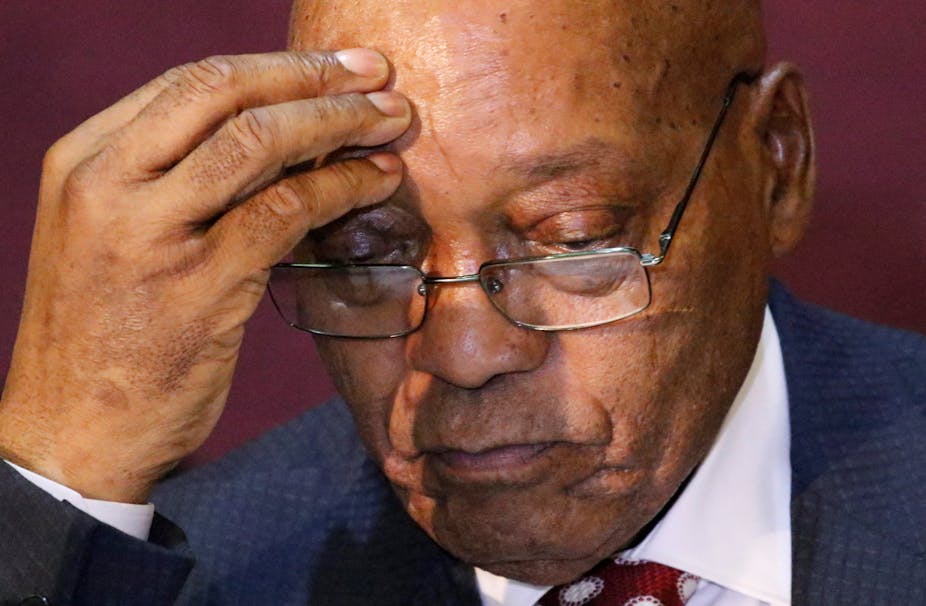South Africa’s president Jacob Zuma is in deep water. Most recently calls for him to go were debated at the National Executive Committee of his governing party, the African National Congress (ANC). This is the body that runs the party between its five-yearly elective conferences.
This came after the country’s former public protector’s report on state capture carried allegations that Zuma may have known about the alleged abuse of his name by the Gupta family and may have actively sought to help the wealthy businessmen benefit from state procurement. He also faces allegations of corruption – some stretching back more than a decade. And the Constitutional Court earlier this year found that his conduct was “inconsistent” with certain sections of the constitution.
The fact that a bid to remove Zuma was staged in the NEC confirmed that there are differences of opinion within the ANC about the fate of the president. While the decision was blocked, the faction that wanted Zuma to go have made a powerful point. Things will never be the same again.
The ANC’s failure to remove the president or outline a plan to bring him to book suggests that the party is not serious about fostering accountability and fighting corruption even though these feature prominently in its official documents and manifestos. This does not bode well for confidence in the South African political system and economy.
Political economic implications
The economy is the weakest link in the present situation. I believe the key focus post the NEC debate is going to be the battle over the control of the National Treasury, and secondly control over the economic cluster. This is a group of ministries that most acutely affect economic policies. They include the ministry of finance, trade and industry, economic development, tourism, small business development, public enterprises, public works, labour, energy and mineral resources, among others.
The first real danger is that Zuma chooses to purge ministers who were behind this week’s bid at the NEC to ask him to step down. These reportedly include Finance Minister Pravin Gordhan, his deputy Mcebisi Jonas, tourism minister Derek Hanekom and public works minister Thulas Nxesi.
If Zuma wrests control of the National Treasury, and other ministries key to the economy, fiscal policy recklessness is expected to become the order of the day.
The dangers of a purge
While the secretary general of the ANC Gwede Mantashe has said that the ministers who spoke against Zuma would not be purged, succession politics and attempts to control resources may result in unilateral presidential decisions to fire ministers without consultation. In South Africa, executive authority to chop and change the cabinet is vested in the president. As such, the president may act unilaterally without consulting his party, although the convention has been that the president first discusses cabinet positions with the ANC’s top leaders.
Zuma has acted unilaterally before. His decision a year ago to fire Nhlanlha Nene as finance minister and replace him with someone who was virtually unknown shocked everyone including colleagues in the ANC. The decision, dubbed Nenegate, sent markets into a tailspin and Zuma was forced to backtrack.
The National Treasury is particularly vulnerable because so much rides on fiscal policy decisions. All cabinet positions are closely linked with control over resources. But control over the national fiscus – including budgeting and spending – is the most important because changes, or drift in fiscal policy invariably affect markets. The country should expect volatility. At best traders and investors might simply choose to remain on the sidelines. At worst the country could experience capital flight. There may also be risky speculation on the currency.
The question is: can anything be done? I believe so.
Call to action
It’s time to engage. Politicians have proved again and again that the future and stability of the country cannot be left entirely to them. The ANC has said that it does not want to “hand over its comrades to ‘the enemy’”. This is close to defining the rest of society as its enemy. It is not clear how a governing party elected by the people on the basis of fighting corruption can trivialise as mere “negative narratives” serious allegations of misconduct and possibly corruption on the part of a president it has elected to the position on behalf of the nation. Is that not blatant abdication of responsibility?
South Africans need to safeguard the continuity of democratic principles. At the centre is impartiality and distribution of economic benefits on the basis of merit as well as the fundamental values of accountability and equality before the law as enshrined in the country’s constitution.
South Africans should not legitimise a system of “neopatrimonialism” where economic gains are linked to kinship or close relationships with rulers. It’s time for society wide renewal.
The real danger is that Zuma feels compelled to weaken the relative strength of the forces opposing his appointed successor in 2017.
As the saying goes in isiXhosa, ikhwelo lityala (“hearing the battle cry and remaining unresponsive is tantamount to treason”)!

